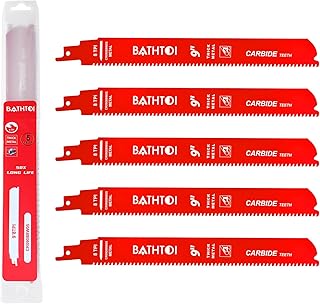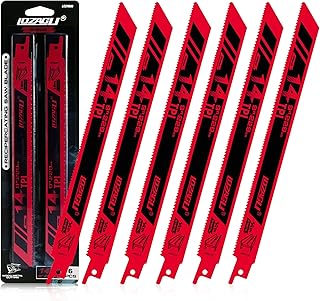When it comes to tackling hardened steel, not every blade can get the job done. That’s why choosing the best sawzall blade for hardened steel makes all the difference. These blades are built to withstand intense pressure, resist wear, and deliver clean cuts where standard blades would fail.
But here’s the thing—many buyers also look for versatility. If you’re considering the best sawzall cordless options for mobility, or comparing choices like the best sawzall blade for cutting aluminum for softer metals, knowing how each blade performs will save you time and frustration. And if you’re exploring the best saws for different applications, understanding blade compatibility is a key step before making a purchase.
Ready to learn which blade is truly up to the challenge? Let’s dive in.
Top Picks
Best Longevity: Diablo Bi-Metal Reciprocating Saw Blades
The Diablo Bi-Metal Reciprocating Saw Blades stand out with their full contact arched design and ultra-hardened edge, which together provide up to five times longer cutting performance compared to standard blades. The dual tooth configuration with small gullets enhances speed and durability, while the Perma-Shield coating effectively protects against heat and corrosion. A 1-inch demolition body minimizes vibration, ensuring straighter, smoother cuts even in demanding applications.
From a professional perspective, these blades are highly valued for their ability to maintain consistent performance over extended use. Many users note that the reduced need for frequent blade changes saves both time and effort, though some may find the cost and fixed 6-inch size limiting depending on their projects.
Overall, this set delivers strong value for professionals who prioritize durability and efficiency. While not the cheapest option, the long lifespan and reliable cutting performance make it a worthwhile investment for heavy-duty work.
Best Durability: 3 Pack Carbide Reciprocating Saw Blades
These 9-inch carbide reciprocating saw blades are engineered for tough cutting jobs, offering exceptional hardness and toughness thanks to their bi-metal body with carbide teeth. The specialized tooth angle reduces friction and heat buildup, ensuring sharpness and smoother cuts even through dense metals. With a design that provides up to fifty times longer life than standard bi-metal blades, they are particularly suited for demanding tasks like cutting cast iron, alloy steel, and rebar. Their universal shank makes them compatible with all major reciprocating saw brands, giving them broad versatility for professional and DIY users alike.
From a user standpoint, the main advantage is their durability and ability to handle materials that quickly wear out conventional blades. Professionals appreciate the stability and precision during cuts, while some note that the pack size may not be sufficient for large-scale projects. Additionally, the aggressive carbide teeth, while ideal for hard metals, can be less efficient on softer materials.
Overall, this 3-pack offers strong value for those needing high-performance blades for heavy-duty metal cutting. The extended lifespan and robust construction justify the investment for users who prioritize efficiency and reduced blade replacement.
Best Sheet Metal Cuts: Bosch RM618 6-Inch 18T Metal Cutting reciprocating Saw Blades
The Bosch RM618 reciprocating saw blades are purpose-built for metalwork, featuring a bi-metal construction that balances cutting durability with flexibility. With 18 teeth per inch and a 0° hook angle, they are optimized for clean, controlled cuts in sheet metal ranging from 10 to 16 gauge. The reinforced pair-setting tooth geometry, with alternating left- and right-facing teeth, accelerates cutting speed while extending blade life. A thin 0.035-inch body and a 3/4-inch blade height further improve accuracy, reduce breakage, and maintain straighter cuts.
Professionals often highlight the blades’ ability to deliver smooth, burr-free cuts in ferrous and non-ferrous metals, making them highly reliable for fabrication and dismantling tasks. While the 6-inch size and specialization limit their use in thicker stock, they are praised for consistent performance and reduced vibration during operation.
Overall, this 5-pack represents strong value for anyone working primarily with sheet metal. The combination of clean cutting ability, durability, and user-friendly design makes it a dependable choice for precision-focused metal cutting jobs.
FAQs
What sawzall blade cuts hardened steel?
Sawzall blades designed for hardened steel are typically made from carbide grit or carbide-tipped teeth. These blades are engineered to handle extreme hardness and maintain cutting efficiency even under heavy use. Standard bi-metal blades, while versatile, tend to wear out quickly when used on hardened materials. For jobs involving tool steel, rebar, or high-strength alloys, a carbide blade is the most reliable choice.
What is the best sawzall blade for steel?
The best sawzall blade for steel depends on the thickness and hardness of the material. For general steel cutting, bi-metal blades with around 14–24 teeth per inch (TPI) work well. However, when cutting hardened steel or thick structural pieces, carbide-tipped blades stand out due to their durability and resistance to heat. These blades can last significantly longer than standard blades, making them cost-effective for tough applications.
What is the best blade for cutting hard metal?
For hard metals such as stainless steel, hardened steel, and cast iron, carbide-tipped blades are the best choice. They provide aggressive cutting action while maintaining sharpness over multiple uses. In cases where extremely abrasive materials are involved, carbide grit blades are also effective because they grind through metal rather than slice it, reducing the risk of tooth breakage.
Which is better diamond or carbide sawzall blades?
Both diamond and carbide sawzall blades have their place, but they serve different purposes. Carbide blades are excellent for hardened steel and tough metals because they can cut with precision and resist wear. Diamond blades, on the other hand, are better suited for cutting very hard, abrasive materials like ceramics, masonry, and tile. When it comes to hardened steel, carbide is generally the superior choice due to its cutting efficiency and longevity.
Conclusion
Cutting hardened steel is a demanding task that requires the right blade. The best sawzall blade for hardened steel is one that combines durability, heat resistance, and precision cutting. Carbide-tipped blades consistently deliver these qualities, making them the top choice for professionals and DIY users alike. By understanding the differences between blade types and their applications, you can choose a sawzall blade that not only saves time but also ensures high-quality results on every project.





















